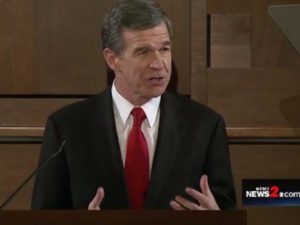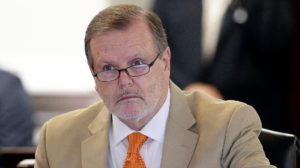
Gov. Cooper gives his first State of the State address. Photo courtesy of WFMY
North Carolina Gov. Roy A. Cooper (D-Nash) rebuked a general lack of legislative cooperation by Republican lawmakers during his first State of the State address, March 13.
As the newly-elected governor, Cooper laid out his long-term vision for a smarter, more sustainable Tarheel state. In an attempt to promote bipartisan cooperation among the state’s General Assembly, Cooper unveiled what he calls “common ground legislature” during his speech at the N.C. Legislative Building in Raleigh.
The phrasing is also found on the cover of Cooper’s proposed state budget for the next three years, entitled “Common Ground Solutions for North Carolina.”
“We have to work together, when we can, to look beyond ourselves to see what’s right for our state, regardless of who’s in power,” Cooper told legislators. “That’s what the people of North Carolina want us to do, and what common sense demands us to do.”
Cooper defeated incumbent Pat McCrory (R-Mecklenburg) by 10,000 votes in a contentious 2016 election, which entailed fierce debate over the future of controversial “bathroom bill” House Bill 2 (HB2), and a 94,000-ballot recount in deeply blue Durham County.
“Aggressive Goals”
While Cooper briefly advocated for a full repeal of HB2, calling the law “a dark cloud hanging over our state of promise” and promising to sign a repeal bill the same day that it’s passed, the governor’s remarks were part of a larger discussion around his unofficial state budget for fiscal years 2017-19.
The budget contains no tax increases, Cooper says, and would save “hundreds of millions of dollars” for the state while simultaneously committing to future projects.

Roy Cooper delivers his first State of the State address to members of the N.C. General Assembly on March 13 as Senate president pro tempore Phil Berger, one of Cooper’s loudest opponents, watches over the governor’s left shoulder.
Photo courtesy of The Raleigh News and Observer
The budget includes a number of reforms to the state’s public education system, designed to increase the standard of living for North Carolina teachers, resulting in a higher quality of education for each student. Changes would mostly affect teachers – present and future – and recent high school graduates with plans to attend one of North Carolina’s myriad community colleges.
“Improving education is an area where we can find common ground,” Cooper said. “We have to measure our progress and hold ourselves accountable.”
Under the proposed budget, the average pay for Tarheel teachers would increase by 5 percent in the first year, followed by another 5 percent hike the next year. North Carolina’s education would become the best in the Southeast by 2019, in theory, and teacher pay would reach the national average by 2021. Cooper says that unlike past budgets, his would provide more money for every teacher, “valuing experienced teachers, as well as those new to the job.”
“We entrust our teachers with their (children’s) futures every day,” Cooper said. “Let’s put our money where our trust is and raise teacher salaries.”
Public school teachers would also be issued a $150 annual stipend to offset classroom costs that many teachers pay for out of pocket.
Another provision, the NC GROW scholarship, would cover in full the cost of any North Carolina community college’s tuition and fees for recent high school graduates. The scholarship is projected to be used as a last-resort: to be eligible, an applicant must have maintained a 2.0 grade point average and have first applied for all other forms of existing financial aid.
In 2014-15, one in nine adult North Carolinians attended one of the state’s 58 community colleges. But according to Cooper, that’s simply not enough.
“I’ve laid out aggressive goals to make North Carolina a top-ten educated state by 2025,” Cooper said. Both sides of the aisle rose in standing ovation.
Outside of education, the new budget would place spotlights on workforce technical training; the encouragement of renewable energy implementation; bringing back the film industry that largely vacated the state in the wake of HB2; and improving high-speed internet accessibility for citizens in rural areas. It would also pay special attention to the improvement of state-funded hospitals and the repair of infrastructure that was damaged or destroyed by Hurricane Matthew in 2016.
“We will be the first to extend a hand”
As Cooper called for cooperation from the General Assembly podium, North Carolina Republicans gave a fiery response, criticizing a slew of entities, including the press and Gov. Cooper himself, as the reason for their less-than-amorous attitude toward the left.
The pre-recorded response, delivered by Senate president pro tempore, Phil Berger (R-Rockingham), attacked Cooper’s credibility in a scathing message.

President pro tempore Sen. Phil Berger delivered Republicans’ response to Gov. Cooper’s address. Photo courtesy of WLOS
“Roy Cooper has treated his election as a mandate to fight Republicans, rather than to work together,” Berger said. “…Gov. Cooper talks often of compromise, but works behind the scenes to kill real compromise.”
Berger was referring to a Dec. 21 special session between N.C. Democrats and Republicans, called to create an emergency replacement for HB2. The session ended with no new bill, and two frustrated parties.
“If Gov. Cooper wants to work together, we will be the first to extend a hand,” said Berger. “But he has to be willing to work with us.”
Cooper asserted that while the two sides may fundamentally disagree, the time for discord has passed. He said that the state’s well-being depends on elected representatives collaborating for the good of their constituents.
“We will find this agreement,” Cooper said. “Because too much is at stake if we don’t… Over the next few months, let’s fulfill our promise to North Carolina, and beyond, that there is room for all of us on that common ground.”
To watch Gov. Cooper’s address and to see Sen. Berger’s response, visit this link.


